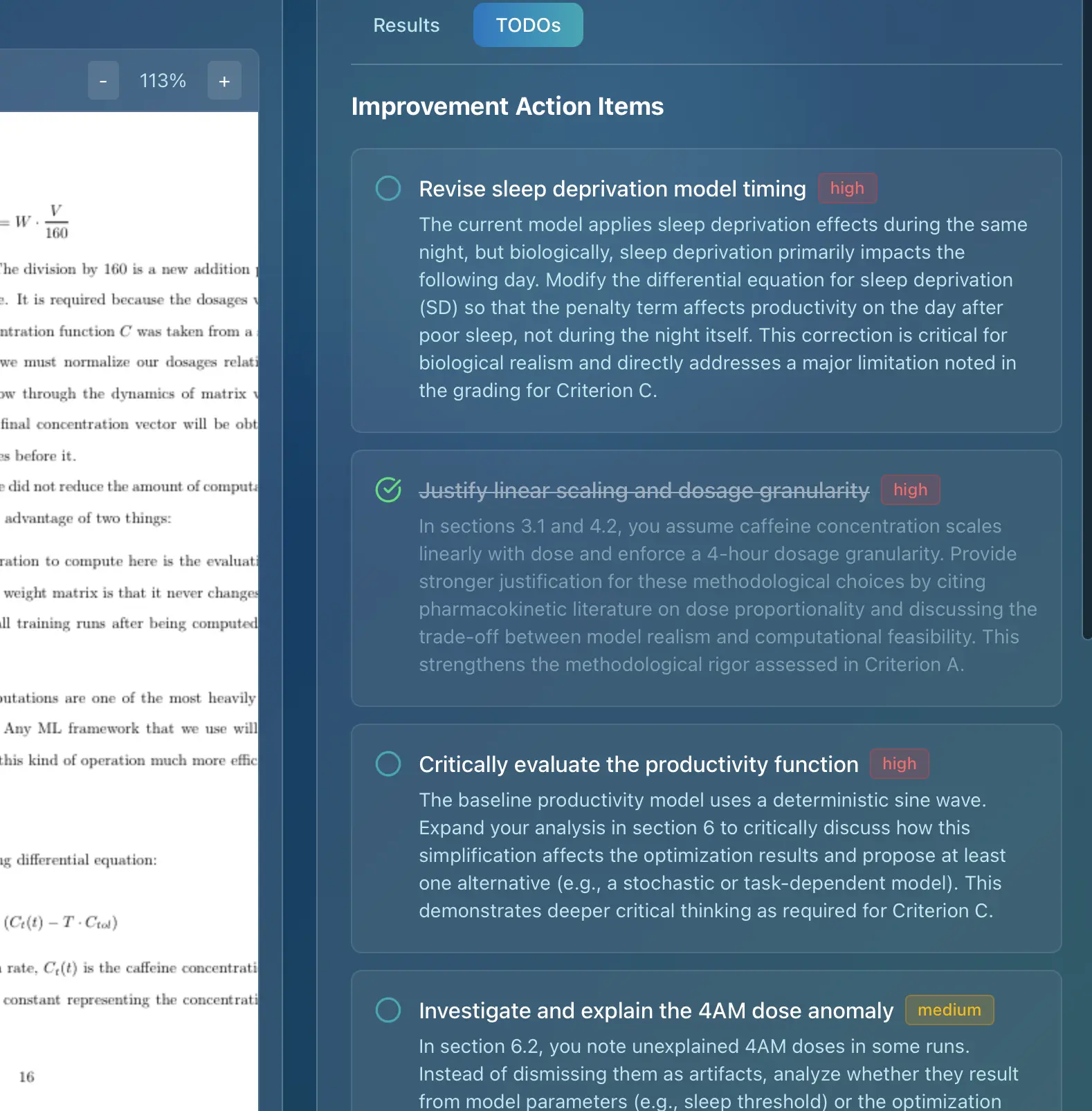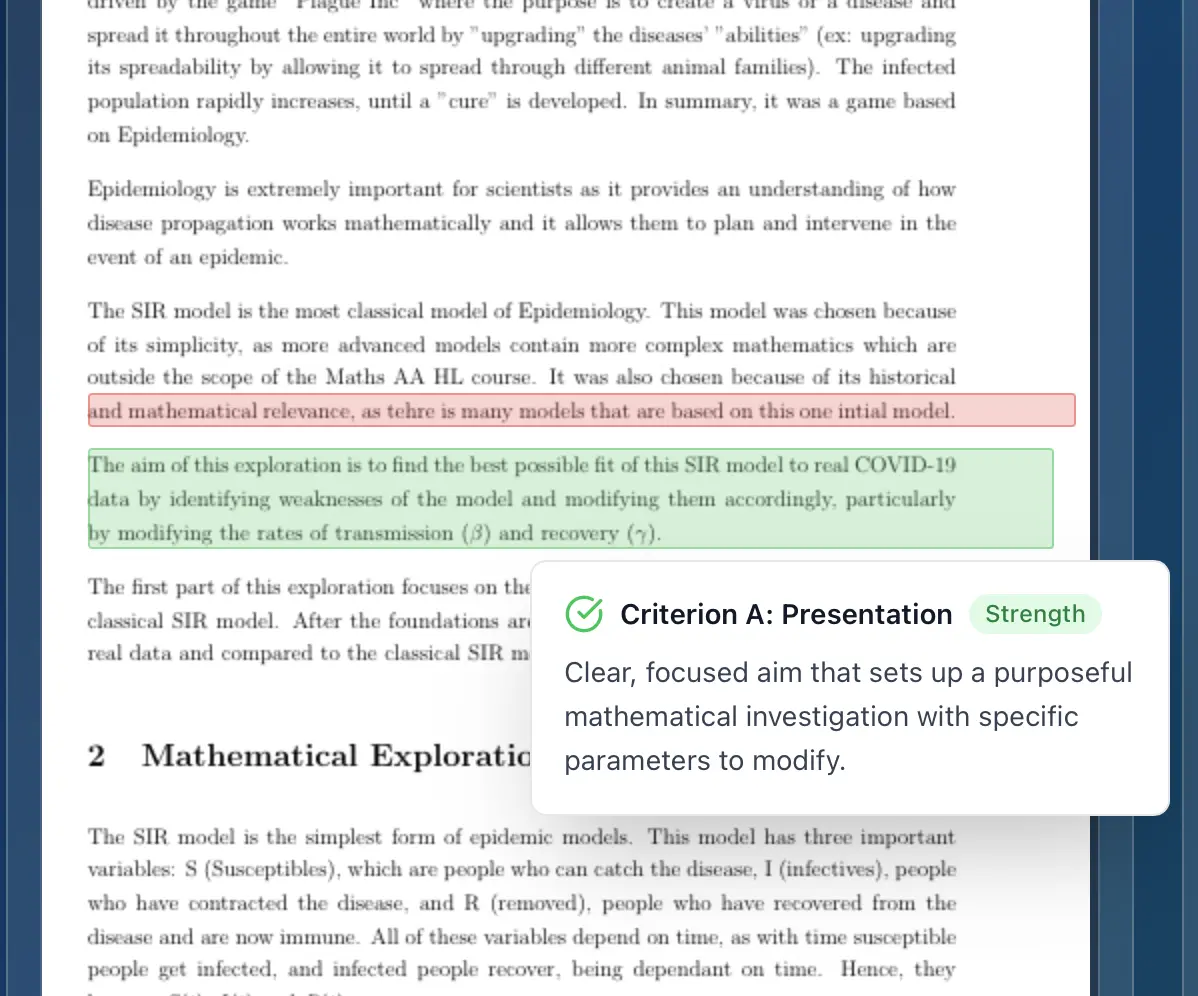IB Spanish Ab Initio: Oral Assessment Preparation Guide
Are you preparing for the IB Spanish Ab Initio oral assessment and feeling overwhelmed? This comprehensive guide is designed to equip you with the knowledge, strategies, and practical tips you need to excel. We'll break down the assessment criteria, explore effective preparation techniques, address common challenges, and even discuss how AI is revolutionizing IB grading. Whether you're aiming for a perfect 7 or simply striving to improve, this guide will provide you with actionable steps to boost your confidence and maximize your score. Let's dive in and conquer the IB Spanish Ab Initio oral assessment together!
Understanding the IB Spanish Ab Initio Oral Assessment
The IB Spanish Ab Initio oral assessment is a crucial component of your overall IB score. It assesses your ability to communicate effectively in Spanish on a personal and thematic level. It's not just about memorizing vocabulary; it's about demonstrating your understanding and ability to use the language in a spontaneous and meaningful way. Let's break down the key components:
- Individual Oral: This is the main part of the assessment. You'll have a conversation with your teacher based on a visual stimulus and a theme from the course.
- Presentation: You will prepare a short presentation on a cultural aspect related to the Spanish-speaking world.
- Discussion: Following your presentation, you will engage in a discussion with your teacher about your presentation topic.
The oral assessment is designed to evaluate your ability to:
- Understand and respond to questions in Spanish.
- Use appropriate vocabulary and grammar.
- Pronounce words clearly and accurately.
- Communicate effectively and fluently.
- Demonstrate cultural understanding.
Struggling with IB Assessments?
Get instant, detailed feedback on your work with AI that understands IB criteria.

Preparing for the Individual Oral: Mastering the Conversation
The individual oral is where you'll have the most direct interaction with your teacher. Here's how to prepare effectively:
1. Familiarize Yourself with the Themes
The IB Spanish Ab Initio course covers several themes. Make sure you have a solid understanding of the vocabulary and grammar related to each theme. Common themes include:
- Identities: Personal characteristics, relationships, lifestyle.
- Experiences: Leisure activities, holidays, travel.
- Human Ingenuity: Entertainment, media, technology.
- Social Organization: Community, education, employment.
- Sharing the Planet: Environment, health, social issues.
2. Practice, Practice, Practice!
The best way to prepare for the oral assessment is to practice speaking Spanish as much as possible. Here are some ideas:
- Role-play: Ask a friend or family member to role-play the oral assessment with you. Provide them with potential questions and visual stimuli.
- Record yourself: Record yourself answering potential questions and then listen back to identify areas for improvement.
- Language exchange: Find a language exchange partner online or in your community and practice speaking Spanish with them.
- Talk to yourself: Seriously! Describe your day, your plans, or your opinions on various topics in Spanish.
3. Build Your Vocabulary
A strong vocabulary is essential for effective communication. Focus on learning vocabulary related to the themes covered in the course. Use flashcards, online resources, and textbooks to expand your vocabulary. Don't just memorize words; learn how to use them in context.
4. Master Grammar Fundamentals
Accurate grammar is crucial for conveying your message clearly. Review the grammar concepts covered in the course, such as verb conjugations, tenses, and sentence structure. Practice using these concepts in your speaking and writing.
5. Prepare Potential Answers
While you can't predict exactly what questions you'll be asked, you can prepare potential answers to common questions related to the themes. This will help you feel more confident and prepared during the assessment.
Example:
- Theme: Experiences (Travel)
- Potential Question: ¿Adónde te gustaría viajar y por qué? (Where would you like to travel and why?)
- Prepared Answer: "Me gustaría viajar a España porque me interesa mucho la cultura española. Quiero visitar Madrid y Barcelona para ver los museos y probar la comida tradicional." (I would like to travel to Spain because I am very interested in Spanish culture. I want to visit Madrid and Barcelona to see the museums and try the traditional food.)
6. Analyze Visual Stimuli
The individual oral often involves a visual stimulus, such as a photograph or a drawing. Practice analyzing visual stimuli and describing what you see. Consider the following:
- What is the subject of the image?
- What are the people doing?
- What is the setting?
- What emotions does the image evoke?
Practice making connections between the visual stimulus and the themes covered in the course.
Preparing for the Presentation and Discussion: Cultural Exploration
The presentation and discussion component requires you to delve into a cultural aspect of the Spanish-speaking world. Here's how to excel:
1. Choose a Topic You're Passionate About
Selecting a topic that genuinely interests you will make the research and preparation process much more enjoyable. It will also make your presentation more engaging for your teacher.
2. Research Thoroughly
Gather information from a variety of sources, including books, articles, websites, and documentaries. Take detailed notes and cite your sources properly.
3. Structure Your Presentation
Organize your presentation logically and clearly. Start with an introduction that grabs the audience's attention and outlines the main points you'll be covering. Develop each point with supporting evidence and examples. Conclude with a summary of your main findings.
Example Presentation Structure:
- Introduction: Briefly introduce the topic and explain why it's important.
- Background: Provide historical context and relevant information.
- Key Aspects: Discuss the main features of the cultural aspect.
- Impact: Explain the impact of the cultural aspect on society.
- Conclusion: Summarize your main points and offer a final thought.
4. Practice Your Delivery
Rehearse your presentation multiple times to ensure a smooth and confident delivery. Pay attention to your pronunciation, intonation, and body language.
5. Anticipate Questions
Think about potential questions your teacher might ask during the discussion. Prepare answers in advance, but be prepared to think on your feet and respond to unexpected questions.
Example Potential Questions:
- ¿Por qué elegiste este tema? (Why did you choose this topic?)
- ¿Cuál es la importancia de este tema en la cultura hispana? (What is the importance of this topic in Hispanic culture?)
- ¿Cómo ha cambiado este tema con el tiempo? (How has this topic changed over time?)
Common Challenges and Mistakes to Avoid
Many students face similar challenges when preparing for the IB Spanish Ab Initio oral assessment. Here are some common mistakes to avoid:
- Lack of Preparation: Failing to prepare adequately is the biggest mistake you can make. Start preparing early and dedicate sufficient time to practice.
- Memorizing Scripts: Memorizing a script will make your presentation sound unnatural and robotic. Focus on understanding the material and speaking spontaneously.
- Poor Pronunciation: Practice your pronunciation regularly to ensure that you're speaking clearly and accurately.
- Limited Vocabulary: Expand your vocabulary by reading, listening to Spanish, and using flashcards.
- Grammatical Errors: Review grammar concepts and practice using them correctly.
- Nervousness: It's normal to feel nervous, but try to relax and focus on communicating effectively. Take deep breaths and remember that your teacher is there to help you.
Pro Tip: Get AI-Powered Grading
Stop second-guessing your grades. Get instant feedback aligned with official IB rubrics.

Advanced Tips and Strategies for a Top Score
Want to go above and beyond? Here are some advanced tips and strategies to help you achieve a top score:
- Use Idiomatic Expressions: Incorporate idiomatic expressions into your speaking to demonstrate a deeper understanding of the language.
- Show Cultural Awareness: Demonstrate your understanding of Hispanic culture by making connections between the themes and your own experiences.
- Use Complex Sentence Structures: Vary your sentence structure to make your speaking more sophisticated.
- Engage with Current Events: Stay up-to-date on current events in the Spanish-speaking world and incorporate them into your discussions.
- Seek Feedback: Ask your teacher or a native speaker to provide feedback on your speaking and writing.
Technology and Modern Assessment: The Role of AI
Technology is transforming the way we learn and assess languages. AI-powered tools are becoming increasingly valuable for both students and teachers. For example, AI can provide personalized feedback on pronunciation, grammar, and vocabulary.
And that's where Marksy comes in. Marksy is an AI grading assistant specifically designed for the International Baccalaureate (IB). It provides instant, accurate, and detailed feedback on student work based on official IB rubrics. This means teachers can save valuable time while ensuring consistent and fair grading. Marksy's rubric-aligned scoring and criterion-by-criterion feedback help students understand exactly how to improve their work and achieve their full potential. By using AI tools like Marksy, educators can focus on providing personalized support and guidance to their students, ultimately leading to better learning outcomes. Marksy uses the official IB criteria to ensure accuracy and fairness, providing students with clear and actionable feedback.
Conclusion: Your Path to Success
The IB Spanish Ab Initio oral assessment can seem daunting, but with thorough preparation and the right strategies, you can excel. Remember to focus on building your vocabulary, mastering grammar fundamentals, practicing speaking regularly, and demonstrating cultural awareness. Avoid common mistakes, seek feedback, and utilize technology to your advantage. By following the tips and strategies outlined in this guide, you'll be well on your way to achieving a top score.
Next Steps:
- Review the official IB Spanish Ab Initio guide.
- Create a study schedule and stick to it.
- Practice speaking Spanish every day.
- Seek feedback from your teacher or a native speaker.
- Consider using AI-powered tools like Marksy to improve your writing and receive detailed feedback.
Ready to take your IB Spanish Ab Initio preparation to the next level? Try Marksy for free today and experience the power of AI-driven feedback! See how our AI grading assistant can help you understand the IB rubrics, identify areas for improvement, and ultimately, achieve your best possible score. Sign up for a free trial now and start your journey to success!